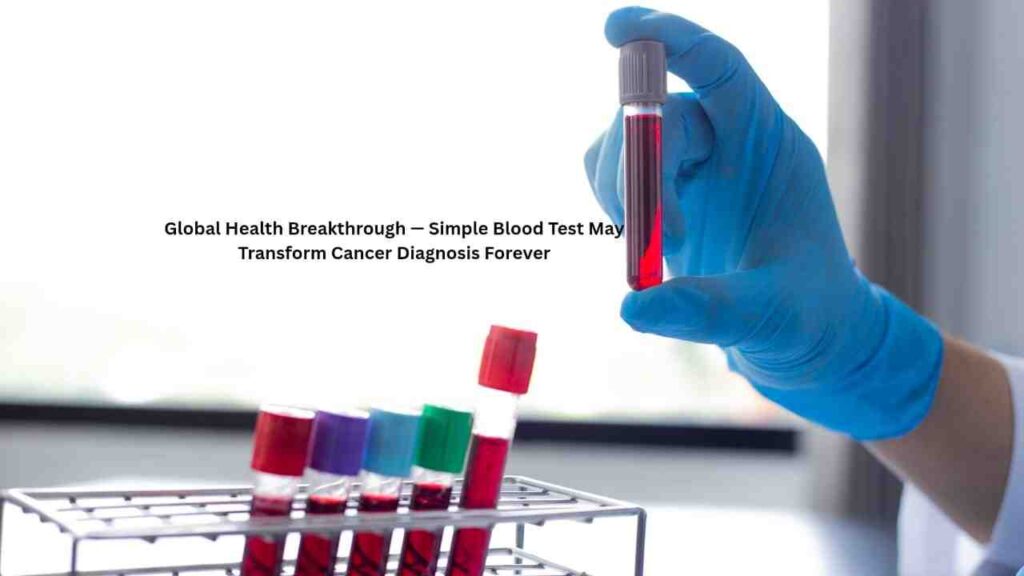A Single Blood Test That Can Spot 50+ Cancers — Even Before Symptoms Show Up

The Dawn of a New Era in Cancer Detection
Imagine walking into a clinic for a simple blood test — and walking out knowing whether you might have cancer long before any symptoms appear. That future is no longer far away.
A group of brilliant researchers from Dana-Farber Cancer Institute, Harvard Medical School, The Francis Crick Institute, and University College London (UCL) have achieved something that could transform healthcare forever:
a groundbreaking blood test capable of detecting over 50 types of cancer from a single vial of blood.
This innovation marks one of the biggest leaps in early cancer detection — a technology that could help doctors find and treat cancer while it’s still curable.
How Does This Magic Work?
The test doesn’t look for just one kind of cancer. Instead, it hunts for tiny fragments of tumor DNA, known as cell-free DNA (cfDNA), that float freely in our bloodstream.
Every cell — healthy or cancerous — leaves behind bits of genetic material. What makes cancer DNA special are chemical patterns called methylation marks. These act like fingerprints, showing scientists where the DNA came from and whether it belongs to a healthy cell or a cancerous one.
Using the power of artificial intelligence and machine learning, the system studies these patterns to figure out two things:
- Whether cancer is present.
- Where in the body it might be hiding — such as the lungs, liver, pancreas, or ovaries.
It’s like having a molecular detective inside your bloodstream.
Game-Changing Accuracy
In large-scale clinical studies, the test demonstrated extraordinary precision — especially when identifying 12 of the world’s deadliest cancers, including:
- Pancreatic cancer
- Ovarian cancer
- Liver cancer
- Esophageal cancer
- Head and neck cancers
These are types that usually stay silent until it’s too late. Yet this new test detected them with over 90% accuracy and could even predict the exact tissue where the cancer began.
That kind of accuracy has never been seen before in a universal blood test.
Why This Could Save Millions of Lives
Traditional screenings — mammograms, Pap smears, colonoscopies — are powerful tools, but each targets just one cancer type. Many deadly cancers, like pancreatic or liver, don’t even have reliable screening options today.
This blood test changes that completely. It’s a multi-cancer early detection tool, meaning it can scan for dozens of cancers at once, from a single blood sample.
Imagine a future where, during your annual health check-up, your doctor simply adds one more test — and it tells you if cancer is starting to grow anywhere in your body.
That’s what researchers like Dr. Geoffrey Oxnard of Dana-Farber Cancer Institute envision.
“Our goal is to find cancer before it spreads — while there’s still time to cure it,” says Dr. Oxnard.
What Happens Next?
The test is now entering real-world clinical trials across the United States and the United Kingdom. Scientists want to see how it performs when used in routine screenings, not just controlled lab environments.
If the results stay consistent, health systems worldwide may soon begin adopting it.
For countries like India, where late diagnosis remains one of the biggest challenges in cancer care, this could be a revolution. Early, affordable, and non-invasive detection could save countless lives — especially in rural or resource-limited regions.
A Glimpse Into a Hopeful Tomorrow
Cancer continues to be one of humanity’s toughest battles, claiming millions of lives every year. But breakthroughs like this give us a reason to hope — and to believe in a future where early detection becomes the norm, not the exception.
A future where a simple blood draw could detect cancer before symptoms ever appear.
A future where treatment starts earlier, survival rates soar, and fear gives way to empowerment.
This test doesn’t just detect cancer — it could redefine what it means to live without fear of it.